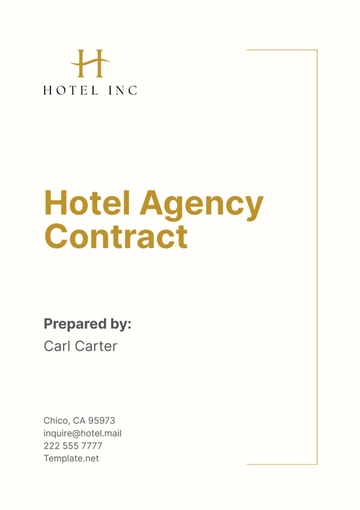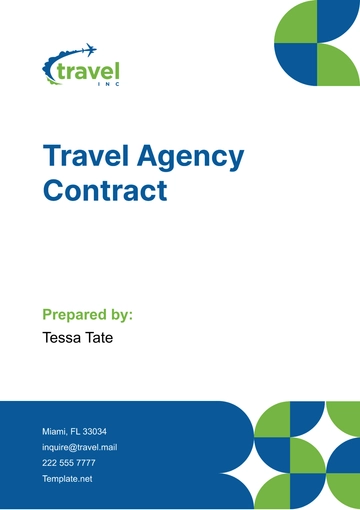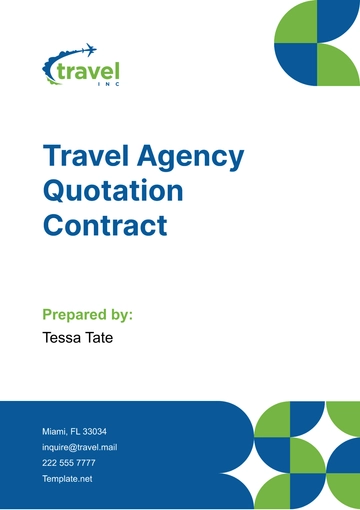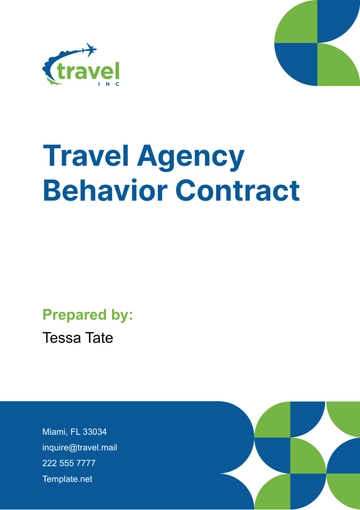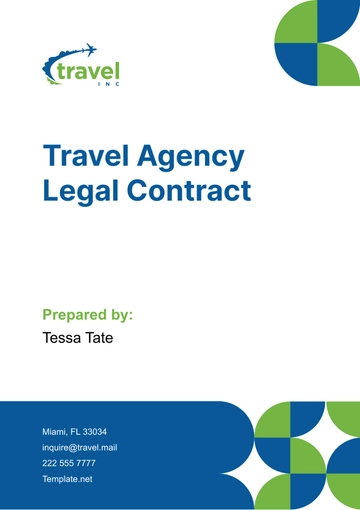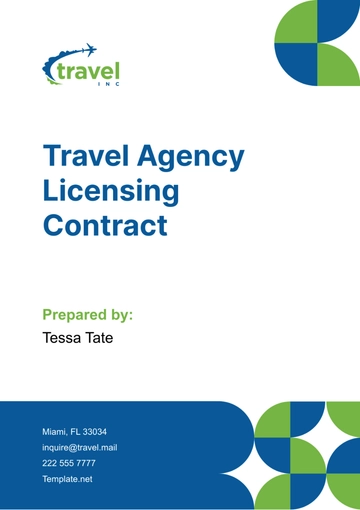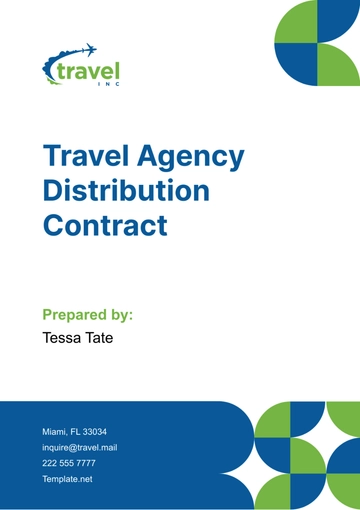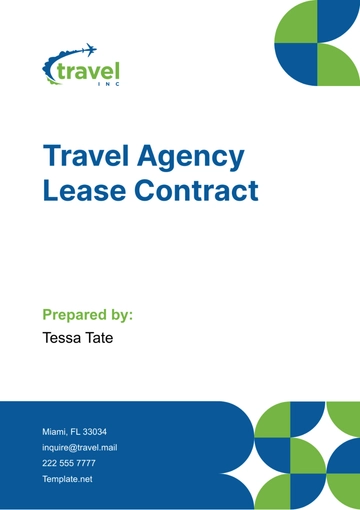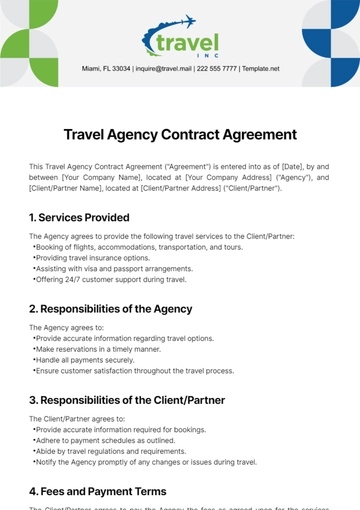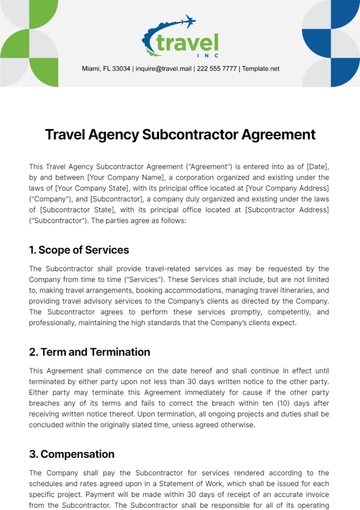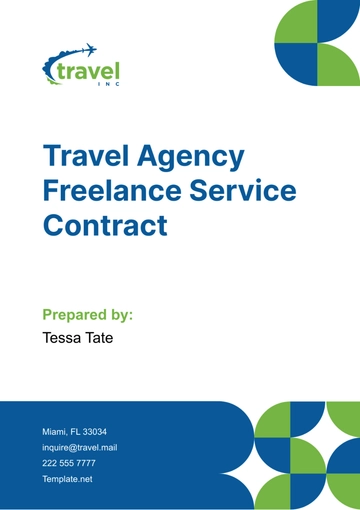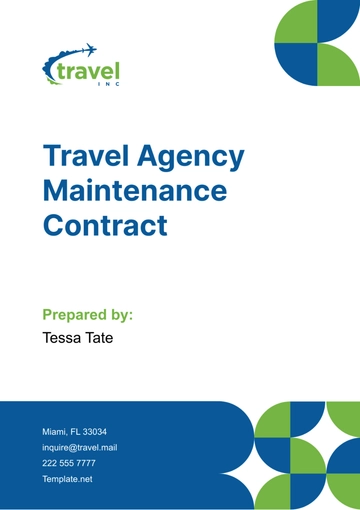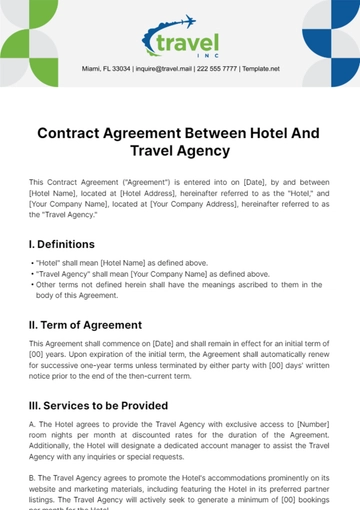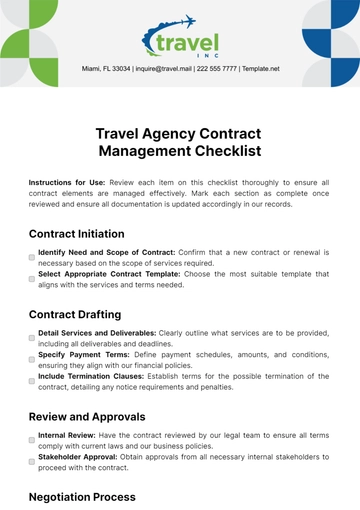Free Travel Agency Equipment Rental Contract
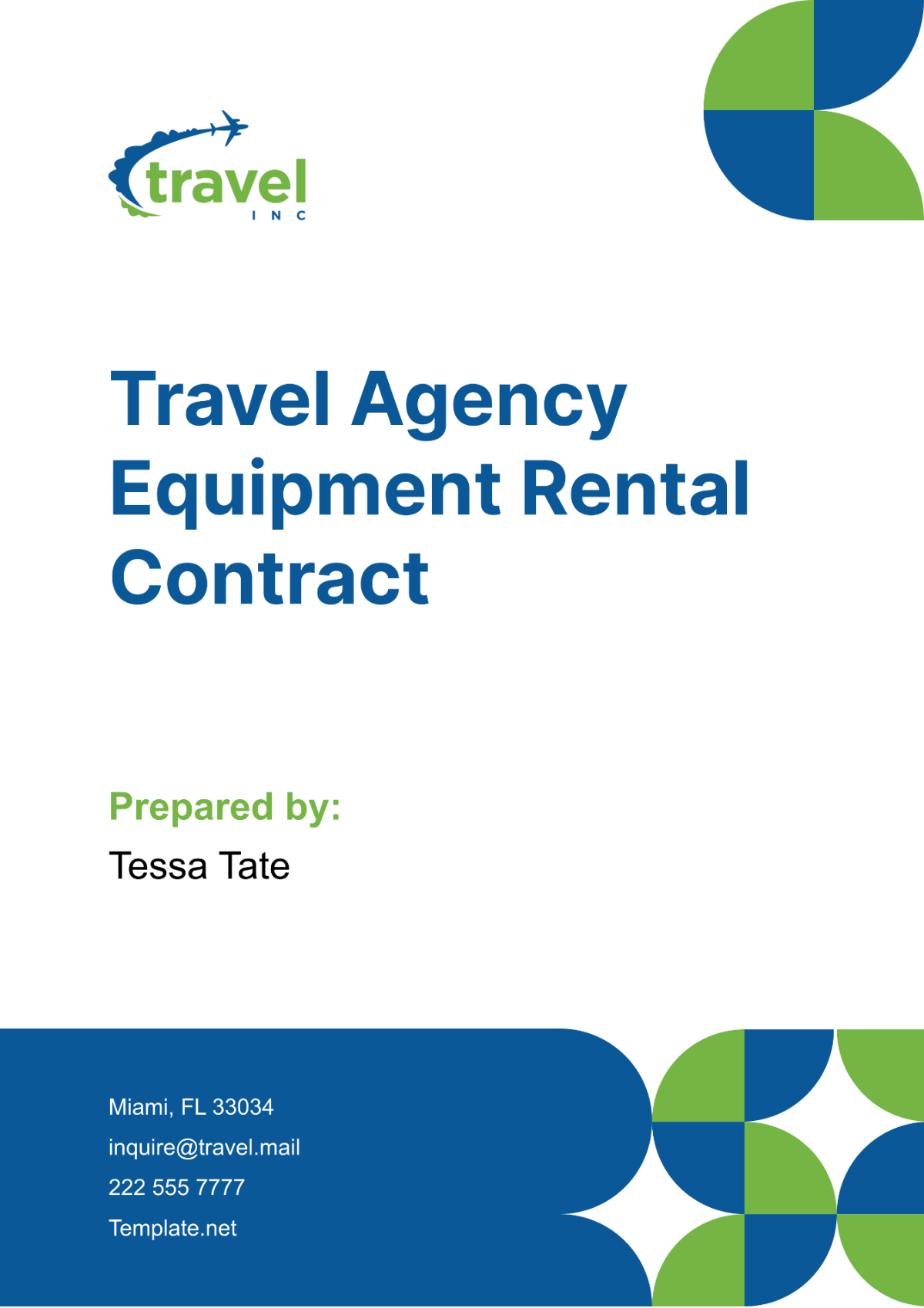
I. The Parties
This Equipment Rental Contract ("Contract") is made and entered into on [Month Day, Year] ("Effective Date") by and between [Your Company Name], with a principal business address at [Your Company Address] ("Lessor"), and [Client's Name], with a principal place of business at [Client's Address] ("Lessee"), collectively referred to as the ("Parties").
WHEREAS, the Lessor is the owner of certain travel and tourism-related equipment (the “Equipment”) that it rents out to various entities;
WHEREAS, the Lessee is in need of such Equipment for its travel and tourism operations and wishes to rent the Equipment from the Lessor in accordance with the terms and conditions set forth in this Contract;
WHEREAS, the Lessor agrees to rent out the Equipment to the Lessee in accordance with the terms and conditions set forth in this Contract;
NOW, THEREFORE, in consideration of the mutual covenants contained herein and for other good and valuable consideration, the receipt and sufficiency of which is hereby acknowledged, the Parties agree as follows:
II. Lease of Equipment
A. Description of Equipment
Equipment Provided: The Lessor hereby rents to the Lessee the following equipment: a fleet of luxury tour buses, a set of camping gear including tents and cooking equipment, and a collection of digital audio tour guides (collectively referred to as the “Equipment”).
Condition of Equipment: The Equipment is in good working condition and is fit for the purpose for which it is intended. The Lessor assures the Lessee that the Equipment has been thoroughly inspected and maintained.
Ownership: The Lessor retains ownership of the Equipment. The Lessee is granted a limited right to use the Equipment in accordance with the terms of this Contract.
Inspection by Lessee: Upon receipt of the Equipment, the Lessee has the right to inspect the Equipment to ensure it is in the condition stated in this Contract.
Return of Equipment: At the end of the lease term, the Lessee agrees to return the Equipment in the same condition as received, subject to normal wear and tear.
B. Equipment Use
Purpose of Use: The Lessee shall use the Equipment solely for its business operations related to travel and tourism. The Lessee shall not use the Equipment for any illegal purpose or in any manner that violates local, state, or federal laws.
Care of Equipment: The Lessee shall handle the Equipment with care, ensuring it is not subjected to unnecessary damage or harsh conditions. The Lessee shall also ensure the Equipment is stored safely when not in use.
Repair and Maintenance: The Lessee shall promptly notify the Lessor of any damage to the Equipment. The Lessee shall not attempt to repair the Equipment without the Lessor’s prior written consent.
C. Equipment Location
Location of Equipment: The Equipment shall be located at the Lessee’s principal place of business or at any other location that the Lessee may move its principal place of business to during the term of this Contract.
Relocation of Equipment: The Lessee shall notify the Lessor in writing before relocating the Equipment. The Lessor has the right to inspect the new location to ensure it is suitable for the Equipment.
Inspection by Lessor: The Lessor shall have the right to inspect the Equipment during the Lessee’s normal business hours upon providing reasonable notice.
III. Term of Lease
A. Lease Commencement
Effective Date: This Contract is effective as of the Effective Date and the lease of the Equipment commences on this date.
Delivery of Equipment: The Lessor will deliver the Equipment to the Lessee on the Effective Date. The Lessee is responsible for providing a suitable location for the delivery and storage of the Equipment.
B. Lease Duration
Lease Period: This lease extends until [Month Day, Year] unless earlier terminated in accordance with the provisions herein. This period is designed to provide the Lessee with sufficient time to make full use of the Equipment.
Renewal: If the Lessee wishes to continue using the Equipment beyond the end of the lease period, the Lessee may request a renewal of this Contract. Any renewal is subject to the Lessor’s approval and may require a renegotiation of the terms of this Contract.
Early Termination: Either party may terminate this Contract before the end of the lease period in accordance with the termination provisions of this Contract.
IV. Rental Fees and Payment Terms
A. Rental Fees
Total Rental Fee: The Lessee agrees to pay the Lessor a total rental fee of [$10,000] for the lease of the Equipment.
Fee Breakdown: The total rental fee includes the lease of the luxury tour buses, camping gear, and digital audio tour guides. The Lessor assures the Lessee that this fee is competitive and commensurate with the quality of the Equipment and the duration of the lease.
B. Payment Schedule
Payment Dates: The Lessee shall pay the rental fee in quarterly installments, each due on the [15th] day of the first month of each quarter.
Late Payment Penalty: Any payment not received by the due date shall incur a late payment fee calculated at [5]% of the overdue amount per month.
Method of Payment: The Lessee can make the payment through various methods such as bank transfer, credit card, or check. The Lessor will provide the necessary details for the payment method chosen by the Lessee.
Receipt of Payment: Upon receipt of each installment payment, the Lessor will provide the Lessee with a receipt acknowledging the payment.
V. Use of Equipment
A. Proper Use
Purpose of Use: The Lessee agrees to use the Equipment in a careful and proper manner, strictly for the purpose of its travel and tourism-related business operations. The Lessee shall not use the Equipment for any illegal purpose or in any manner that violates local, state, or federal laws.
Care and Maintenance: The Lessee is responsible for the regular care and maintenance of the Equipment during the rental term. This includes cleaning the Equipment, ensuring it is stored safely when not in use, and promptly reporting any issues or malfunctions to the Lessor.
Alterations: The Lessee shall not make any alterations or modifications to the Equipment without the prior written consent of the Lessor. Any alterations made without consent may result in penalties.
Training: The Lessee is responsible for ensuring that any person using the Equipment is properly trained and competent to do so. The Lessee should also ensure that all users are aware of and comply with the terms of this Contract.
Safety: The Lessee must ensure that the Equipment is used in a safe manner and in accordance with any safety instructions provided by the Lessor or the manufacturer of the Equipment.
B. Restrictions on Use
Subleasing: The Lessee shall not sublease, lend, or otherwise allow third parties to use the Equipment without the prior written consent of the Lessor.
Location: The Equipment shall not be moved from the location specified in this Contract without the prior written consent of the Lessor.
Overuse: The Lessee shall not use the Equipment in a manner that exceeds its normal operating capacity or that could reasonably be expected to cause excessive wear and tear.
Illegal Activities: The Lessee shall not use the Equipment for any illegal activities or in violation of any laws or regulations.
VI. Maintenance and Repairs
A. Lessee’s Responsibilities
Regular Maintenance: The Lessee shall be responsible for the regular maintenance of the Equipment during the rental term. This includes routine cleaning, inspection, and minor repairs.
Reporting of Issues: The Lessee shall promptly report any issues or malfunctions of the Equipment to the Lessor. The Lessee shall not attempt to repair the Equipment without the Lessor’s prior written consent.
Costs: Unless otherwise agreed in writing, the Lessee shall bear all costs associated with the maintenance and repair of the Equipment.
B. Lessor’s Responsibilities
Major Repairs: The Lessor shall be responsible for any major repairs that are necessary due to normal wear and tear or inherent defects in the Equipment.
Availability: The Lessor shall make themselves available to provide advice and assistance regarding the maintenance and repair of the Equipment.
Replacement: If the Equipment cannot be repaired or it is not economical to do so, the Lessor shall provide a suitable replacement for the Equipment. The replacement shall be of similar type and quality and shall be subject to the terms of this Contract.
VII. Insurance
A. Insurance Coverage
Insurance Requirement: The Lessee shall procure and maintain insurance against theft, loss, damage, and destruction of the Equipment for its full replacement value. The insurance policy should cover all risks associated with the use, possession, and operation of the Equipment.
Liability Insurance: In addition to the insurance for the Equipment, the Lessee shall also maintain public liability and property damage insurance. This insurance should cover any liabilities arising out of the use, possession, and operation of the Equipment.
Additional Insured: The Lessor shall be named as an additional insured on all insurance policies required by this Contract. This ensures that the Lessor is covered by the insurance in the event of any loss or damage to the Equipment.
Proof of Insurance: Evidence of such insurance, naming Lessor as an additional insured, shall be provided to Lessor upon the commencement of this Contract and at each renewal of said insurance.
B. Claims
Notification of Loss: In the event of any loss or damage to the Equipment, the Lessee shall promptly notify the Lessor and the insurance company.
Filing of Claims: The Lessee shall be responsible for filing any insurance claims related to the Equipment. The Lessee shall cooperate fully with the Lessor and the insurance company in the investigation and resolution of any claims.
Deductibles: The Lessee shall be responsible for any deductibles on the insurance policies.
VIII. Default and Remedies
A. Events of Default
Non-Payment: Failure by the Lessee to make any payment due under this Contract within [10] days of the due date shall constitute a default. This default triggers the Lessor’s right to take action to enforce the terms of the Contract and to seek remedies for the breach.
Breach of Contract: Failure by the Lessee to comply with any other terms, conditions, or covenants of this Contract shall constitute a default. This includes, but is not limited to, failure to maintain the Equipment properly, failure to insure the Equipment, or use of the Equipment for unauthorized purposes.
Insolvency: If the Lessee becomes insolvent, files for bankruptcy, or is unable to pay its debts as they become due, it shall constitute a default. This protects the Lessor in the event of the Lessee’s financial instability.
B. Remedies
Right to Cure: Upon default, the Lessor may give the Lessee written notice of the default and a [30-day] period to cure the default. This gives the Lessee an opportunity to rectify the breach and avoid termination of the Contract.
Termination: If the Lessee fails to cure the default within the specified period, the Lessor may terminate this Contract and repossess the Equipment without being liable for any damages of any nature.
Damages: In addition to any other remedies available to the Lessor, the Lessor may seek to recover damages resulting from the Lessee’s default. This could include lost rental fees, costs of recovering the Equipment, and costs of repairing damage to the Equipment.
Legal Action: The Lessor reserves the right to take legal action against the Lessee to enforce the terms of this Contract and to recover any damages.
IX. Termination
A. Termination Notice
Right to Terminate: This Contract may be terminated early by either Party by providing a [30-day] written notice to the other Party. This provision allows either party to end the Contract if they believe that it is not in their best interest to continue.
Method of Termination: The termination notice must be delivered via a method that allows for confirmation of receipt, such as registered mail, email with read receipt, or personal delivery.
Effect of Termination: Upon termination, all obligations under this Contract will cease, except for those obligations that are intended to survive termination.
Final Settlement: Upon termination, a final settlement will be conducted. Any outstanding payments due to the Lessor for services rendered prior to the notice of termination must be paid in full.
B. Early Termination
Grounds for Early Termination: Either party may terminate this Contract before the completion of the Services if the other party breaches any of its obligations under this Contract and fails to remedy the breach within a specified period after receiving a written notice of the breach.
Consequences of Early Termination: In the event of early termination, the terminating party may be entitled to compensation for any loss suffered as a result of the breach that led to the termination.
X. Confidentiality
A. Confidentiality Obligation
Confidentiality Agreement: Both Parties agree to maintain the confidentiality of the terms of this Agreement and any proprietary information shared during the term. This includes, but is not limited to, financial details, business strategies, and client information.
Scope of Confidentiality: The confidentiality extends to all forms of communication, whether oral, written, or electronic.
Legal Requirement: The Parties may disclose confidential information when required by law, but must notify the other Party before doing so, unless such notification is prohibited by law.
Notification of Breach: In the event of a breach of confidentiality, the offending Party must immediately notify the other Party and take all necessary steps to prevent further breaches.
Remedies for Breach: Breach of this confidentiality obligation may result in legal action for injunctive relief, damages, or both.
B. Confidentiality Period
Duration of Confidentiality: The confidentiality obligations under this Agreement shall remain in effect for a period of [5] years from the date of this Agreement.
Post-Termination Obligations: The confidentiality obligations shall survive the termination of this Agreement and continue for the aforementioned period.
Return of Confidential Information: Upon termination of this Agreement, each Party must return or destroy all confidential information belonging to the other Party.
Certification of Return or Destruction: Each Party must provide a written certification to the other Party confirming the return or destruction of all confidential information.
XI. Governing Law
A. Jurisdiction
Governing Law: This Contract shall be governed by and construed in accordance with the laws of [State Name].
Conflict of Laws: The Contract will be interpreted without regard to its conflicts of law principles.
Venue: Any legal proceedings arising out of this Contract shall be conducted in the courts of [State Name].
Enforcement of Judgments: Any judgments obtained in such courts may be enforced in any jurisdiction.
B. Dispute Resolution
Arbitration: Any disputes arising out of this Contract shall be resolved through binding arbitration in [State Name].
Arbitration Rules: The arbitration shall be conducted under the rules of the [American Arbitration Association].
Arbitrator’s Decision: The decision of the arbitrator shall be final and binding on both Parties.
Court Proceedings: If arbitration is not successful, Parties agree to submit to the jurisdiction of the courts in [State Name].
XII. Entire Agreement
A. Supersedes Previous Agreements
Entire Agreement: This Contract constitutes the entire agreement between the Parties regarding the subject matter hereof.
Supersedes Prior Agreements: This Contract supersedes all prior agreements and understandings, both written and oral, between the Parties with respect to the subject matter hereof.
No Oral Modifications: This Contract may not be modified orally.
Written Amendments Only: Any amendments to this Contract must be in writing and signed by both Parties.
Waiver: No waiver of any provision of this Contract shall be effective unless in writing and signed by the Party waiving its rights.
B. Amendments
Written Amendments: Any amendments to this Contract must be in writing and signed by both Parties.
Oral Amendments Not Binding: Oral amendments or understandings not incorporated into the Contract are not binding on either Party.
Amendment Procedure: Any proposed amendments must be submitted in writing to the other Party and signed by both Parties to be effective.
Effect of Amendment: Any amendment will become part of this Contract and will bind both Parties.
No Retroactive Amendments: Amendments will not have a retroactive effect unless expressly stated in the amendment.
Conflict with Original Contract: In the event of a conflict between an amendment and the original Contract, the terms of the amendment will prevail.
XIII. Signature
IN WITNESS WHEREOF, the Parties hereto, intending to be legally bound hereby, have each duly executed this Contract.
Lessor

[Authorized Representative Name]
[Your Company Name]
Date: [Month Day, Year]
Lessee

[Client's Name]
Date: [Month Day, Year]
- 100% Customizable, free editor
- Access 1 Million+ Templates, photo’s & graphics
- Download or share as a template
- Click and replace photos, graphics, text, backgrounds
- Resize, crop, AI write & more
- Access advanced editor
Facilitate smooth transactions and protect assets with our customizable Travel Agency Equipment Rental Contract Template! This editable document from Template.net provides a legally binding agreement for renting out equipment to clients for their travels. Customize the contract using our user-friendly AI Editor Tool to include rental terms and specific provisions!
You may also like
- Rental Contract
- Contractor Contract
- Contract Agreement
- One Page Contract
- School Contract
- Social Media Contract
- Service Contract
- Business Contract
- Restaurant Contract
- Marketing Contract
- Real Estate Contract
- IT Contract
- Cleaning Contract
- Property Contract
- Supplier Contract
- Partnership Contract
- Food Business Contract
- Construction Contract
- Employment Contract
- Investment Contract
- Project Contract
- Payment Contract
- Student Contract
- Travel Agency Contract
- Startup Contract
- Annual Maintenance Contract
- Employee Contract
- Gym Contract
- Event Planning Contract
- Personal Contract
- Nursing Home Contract
- Law Firm Contract
- Work from Home Contract
- Software Development Contract
- Maintenance Contract
- Music Contract
- Amendment Contract
- Band Contract
- DJ Contract
- University Contract
- Salon Contract
- Renovation Contract
- Photography Contract
- Lawn Care Contract

